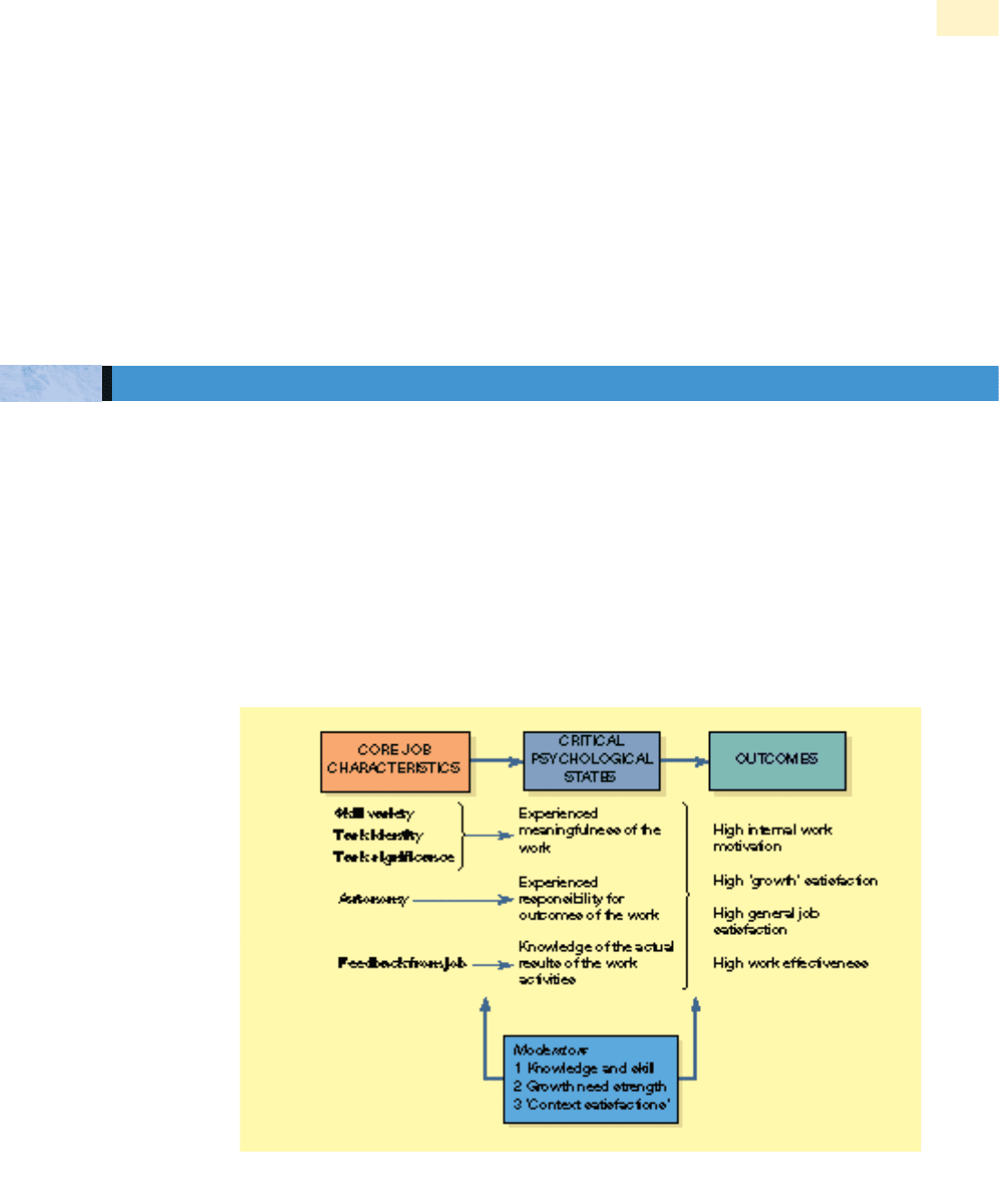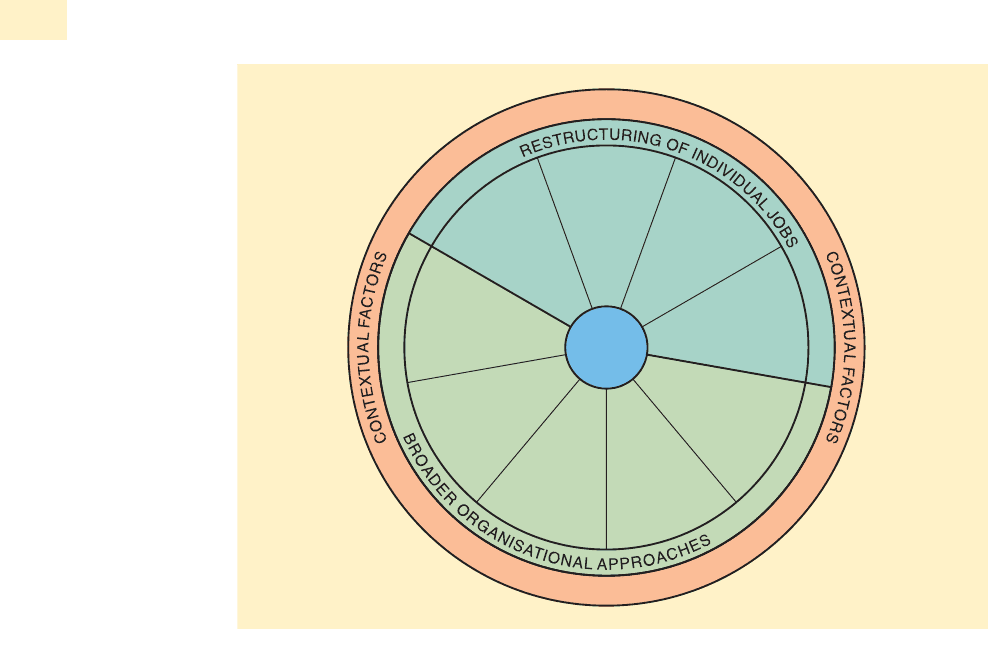Mullins L.J. Management and organisational behaviour, Seventh edition
Подождите немного. Документ загружается.


Main methods of achieving job enrichment include the following:
■ permitting workers greater freedom and control over the scheduling and pacing of
their work as opposed to machine pacing;
■ allowing workers to undertake a full task cycle, build or assemble a complete prod-
uct or component, or deliver a complete service;
■ providing workers with tasks or jobs which challenge their abilities and make fuller
use of their training, expertise and skills;
■ giving workers greater freedom to work in self-managing teams with greater respon-
sibility for monitoring their own performance and the minimum of direct
supervision; and
■ providing workers with the opportunity to have greater direct contact with clients,
consumers or users of the product or service.
Attempts to improve intrinsic motivation must not only include considerations of job
characteristics but also take account of individual differences and attributes, and
people’s orientation to work. A popular and comprehensive model of job enrichment
has been developed by Hackman and Oldham (see Figure18.6).
47
The model views job
enrichment in terms of increasing five core job dimensions: skill variety, task identity,
task significance, autonomy and feedback. These core job characteristics create three
psychological states:
■ experienced meaningfulness of the work;
■ experienced responsibility for the outcomes of the work; and
■ knowledge of the actual results of the work activities.
CHAPTER 18 JOB SATISFACTION AND WORK PERFORMANCE
715
A COMPREHENSIVE MODEL OF JOB ENRICHMENT
Figure 18.6 A job characteristics model of work motivation
(Source: Hackman, J. R. and Oldham, G. R. Work Redesign, Figure 4.6, p. 90. © 1980 by Addison-Wesley Publishing Company, Inc.)

Five core dimensions
The five core job dimensions can be summarised as follows:
■ skill variety – the extent to which a job entails different activities and involves a
range of different skills and talents;
■ task identity – the extent to which a job involves completion of a whole piece of
work with a visible outcome;
■ task significance – the extent to which a job has a meaningful impact on other
people, either inside or outside the organisation;
■ autonomy – the extent to which a job provides freedom, independence and discre-
tion in planning the work and determining how to undertake it;
■ feedback – the extent to which work activities result in direct and clear information
on the effectiveness of job performance.
An example of a job with little enrichment could be that of a production assembly line
worker, or a kitchen porter, where all five core characteristics are likely to score low. An
example of an enriched job could be that of a parish priest who draws upon a wide
range of social skills and talents, who can usually identify with the whole task, and
whose job has clear and important meaning and significance. There is a very high level
of autonomy, and likely to be direct and clear feedback.
From these five core job dimensions, Hackman and Oldham have developed an equa-
tion which gives a single index of a person’s job profile. By answering a questionnaire –
the Job Diagnostic Survey (JDS) – and by giving a score (between 1 and 7) to each job
dimension, the person can calculate an overall measure of job enrichment, called the
motivating potential score (MPS).
Examples of questions from the JDS are:
■ How much variety is there in your job?
■ To what extent does your job involve doing a whole and identifiable piece of work?
■ In general, how significant or important is your job?
■ How much autonomy is there in your job?
■ To what extent does doing the job itself provide you with information about your
work performance?
Skill Task Task
{
variety + identity + significance
}
MPS = × Autonomy × Feedback
3
The first three job dimensions of skill variety, task identity and task significance are
averaged, since it is the combination of these dimensions which contributes to experi-
enced meaningfulness of work. The remaining two job dimensions, autonomy and
feedback, stand on their own. Since scores for skill variety, task identity and task signif-
icance are additive, this means that the absence of one dimension can be partially
offset by the presence of the other dimensions. However, if either autonomy or feed-
back is absent then, because of the multiplicative relationship, the MPS would be zero.
The job would offer no potential to motivate the person.
Empirical support for the model
Empirical support for the model is mixed. From their own studies, Hackman and
Oldham claim that people with enriched jobs, and high score levels on the Job
Diagnostic Survey, experienced more satisfaction and internal motivation. The core job
dimensions of skill variety, task identity and task significance combined to predict the
716
PART 7 MANAGEMENT OF HUMAN RESOURCES
Motivating
potential score

level of experienced meaningfulness of the work. The core dimensions of autonomy
and feedback did not relate so clearly to experienced responsibility and knowledge of
results. Some of the other dimensions were as good, or better, in predicting these psy-
chological conditions. In general, however, the results of their studies showed that jobs
which scored high on the core dimensions were associated with high levels of personal
and work outcomes.
In a study of a sample of six hotels (with between 35 and 65 bedrooms) in Great
Yarmouth, Lee-Ross undertook an examination of the reliability of the job diagnostic
survey among seasonal workers. From an analysis of 163 questionnaires, Lee-Ross con-
cludes that in general reliability scores were compatible with those of Hackman and
Oldham. The job diagnostic survey appears to hold just as well for hotel workers as for
workers in other industries.
48
Based on integrating Hackman and Oldham’s job characteristics model with
Maslow’s hierarchy of needs, Roe et al. propose a general model of work motivation,
tested with Bulgarian, Hungarian and Dutch workers. The model indicates that situa-
tional characteristics lead to critical psychological factors, inducing two main
motivational factors – job involvement and organisational commitment – which in
turn lead to two proximal outcomes of work motivation – effort and job satisfaction,
which affect performance, stress and tendency to leave the organisation. Although
there were some differences there was also a large degree of similarity in results across
the three countries.
49
Approaches to improved job design now take on a broader perspective. For example, in
the context of technological change the focus of attention has spread from manipulat-
ing the tasks of individual jobs to the wider organisational context. Attention needs to
be given to improving the effectiveness of the organisation in achieving its goals and
objectives; and helping the development of skills and resources to manage successfully
changes in the way the organisation functions. (See Figure 18.7.)
The quality of working life
Increased interest in job design has been associated with the development of a broader
social concern for the quality of working life (QWL). The concept of QWL is not new
but an approach to the organisation of work and managing people that has evolved
over a long period of time. In 1973 a Department of Employment report, On the Quality
of Working Life, summarised case studies of people’s experiences of work and descrip-
tions of experiments in improving work systems in four countries, including the UK.
50
It made recommendations for future government initiatives. The report dealt with five
main themes:
■ efficiency at work;
■ satisfaction at work;
■ the link between satisfaction and efficiency;
■ the influence of environmental factors and particularly work technology; and
■ developments of thought in social science and people’s expectations from work.
It is not always easy to determine the extent to which attention to QWL is based on
the exercise of a genuine social responsibility (discussed in Chapter 5) or based on the
pursuit of increased economic efficiency. In practice, the distinction is blurred and
attention to QWL is likely to be motivated by a combination of concern with two
related issues:
CHAPTER 18 JOB SATISFACTION AND WORK PERFORMANCE
717
BROADER ORGANISATIONAL APPROACHES TO IMPROVED JOB DESIGN

■ a moral or ethical motivation based on the recognition of broader educational stan-
dards, changing social values and wider expectations of the quality of working life,
including the satisfaction that people derive from their work, and the functioning
and management of organisations; and
■ motivation through good business practice and enlightened self-interest, the need
for cost competitiveness, and attempts to overcome high levels of absenteeism, staff
turnover and dissatisfaction, and other obstacles to the search for improved organi-
sational performance.
Since the publication of the Department of Employment report increasing emphasis is
being given to the importance of a QWL culture. Such a culture can be seen as a neces-
sary foundation for a successful strategy of Total Quality Management. In order to
translate the concept of QWL into practice it is best understood if it is seen as a goal, as
a process for achieving that goal and as a philosophy setting out the way people
should be managed.
■ QWL as a goal – improving organisational effectiveness through the creation of
more challenging, satisfying and effective jobs and work environments.
■ QWL as a process – calling for efforts to realise this goal through the active involve-
ment of people throughout the organisation. It is about organisational change
usually from a ‘control’ to an ‘involvement’ organisation.
■ QWL as a philosophy – viewing people as ‘assets’ capable of contributing skills,
knowledge, experience and commitment, rather than as ‘costs’ that are merely
extensions of the production process. It argues that encouraging involvement and
providing the environment in which it can flourish produces tangible rewards for
both individuals and organisations.
718
PART 7 MANAGEMENT OF HUMAN RESOURCES
Comprehensive
model of job
enrichment
Job
enrichment
Job
enlargement
Job
rotation
The work/life
debate
JOB
DESIGN
Quality of
working
life
Flexible
working
arrangements
Employee
involvement
and
empowerment
Self-managed
work groups
Figure 18.7 Main approaches to job design
The essential
culture of QWL

The QWL approach is therefore a broad and flexible strategy rooted in the involvement
and participation of people at all levels in the organisation.
51
A major study into the quality of working life carried out by the Institute of
Management and University of Manchester Institute of Science and Technology
tracked 5000 managers over a five-year period. The survey revealed a serious mismatch
between the values and expectations of individuals and company behaviour. Almost 60
per cent say they value their work and home life equally, yet only 15 per cent report
that their organisation makes any attempt to help them balance their work and home
commitments. The majority of professionals feel under constant time pressure with
tight deadlines as the main reason for working long hours and over half suffer from
information overload. Since the study began, 85 per cent of the managers taking part
in the study report that the biggest change in the workplace is the sheer volume of
information they have to deal with.
52
According to a survey carried out by Robert Half International on behalf of
Management Today, 67 per cent of respondents dismissed the job-for-life as a key
demand for their working lives. ‘People are no longer relying on their companies to
provide career development or even satisfaction – they want a more maverick lifestyle.’
A further trend, especially among younger managers, was the attraction of flexibility
and working from home.
53
CHAPTER 18 JOB SATISFACTION AND WORK PERFORMANCE
719
Quality of
working life
study
Institutionalising change
Today’s business climate is increasingly characterised by
fierce global competition and rapid change with ever rising
standards of reliability, performance and quality. Success in
such a competitive environment requires continuous
improvement in methods of production and service delivery
and an ability to spot opportunities and respond to them.
Organisations must adapt to this environment and keep on
adapting it is not a once and for all task. It is not enough for
example to identify successful practices of competitors
and copy them, because by the time the changes have
been implemented the competition may well have moved
on. What organisations must do is come to terms with
change and build it into the culture of their organisations.
Change, in other words, must be institutionalised.
How does an organisation become responsive to
change? There is no simple answer to this question and
factors such as sufficient investment and up to date tech-
nology play an important part but it is generally the people
who work in organisations who make the biggest differ-
ence. The 1997 European Commission’s Green Paper
‘Partnership for a new organisation at work’ identified
people as the key resource in the way work should be
organised in future if Europe is to be competitive. In the
words of the Green Paper ‘Organisations are valued not
only on the basis of their products or machines but primar-
ily on the knowledge creating capacity of the workforce,
the people who work for them, how they work, what work
means to them. The rate of innovation and change in prod-
ucts and technologies is so rapid that the competitive
advantages of companies and countries will be the capac-
ity of the workforce to create knowledge.’
Improving the quality of working life
ACAS’s own experience accords with many of the mes-
sages of the European Green Paper, particularly the
importance of organising work to get the best from people.
ACAS has produced two advisory booklets ‘Effective
organisations: the people factor’ and ‘Teamwork: success
through people’. These booklets describe an approach to
improving organisational effectiveness by enhancing the
quality of working life through more challenging, satisfying
jobs coupled with the involvement and commitment of
employees and their representatives. This way of working
promotes understanding and responsibility which com-
bined with open communication can help an organisation
become more responsive. If people understand what they
are doing and why they are doing it they are more likely to
understand when and why change is needed. Inherent in
this approach are a number of general principles and I
intend to use the rest of this article to look at some of these
in more detail.
First of all managers must believe in people as ‘assets’
capable of contributing skills, knowledge, experience and
If you want people to do a good job, give them a good job
to do
EXHIBIT 18.1

Arising from the QWL approach, increasing attention is focused today on the debate of
the work/life balance. In 1998, Management Today conducted their first ‘Worklife
Survey’. Results of the survey found that although for many, work remained a high
source of satisfaction, it wasn’t going too well for Britain’s managers. The price of a sat-
isfying career can be high with 84 per cent admitting to making important personal
sacrifices in pursuit of their career.
54
Using the original 1998 survey as a benchmark, Management Today undertook a
second survey in 2001.
Things have changed since we brought managers into the thick of the work/life debate with our
first survey into staff attitudes in 1998. Today, achieving a proper balance is seen as an entitle-
ment by almost all those who work … And that in turn is a reflection of the changing contract
between organisations and individuals.
55
720
PART 7 MANAGEMENT OF HUMAN RESOURCES
commitment, rather than as ‘costs’ that are merely exten-
sions of the production process. Douglas McGregor’s
well-known polarisation of managers into Theory ‘X’ or
Theory ‘Y’ types illustrates the two extremes that managers
might assume about what motivates human behaviour.
Theory ‘X’ managers believe that people inherently dislike
work and will avoid it if they can and must therefore be
directed bribed or coerced and controlled. Theory ‘Y’ man-
agers on the other hand assume that people find work as
natural as play or rest and will exercise self-direction and
self-control to achieve objectives to which they are com-
mitted and have more potential than is generally used.
Flexible workers willing to contribute ideas are more likely
to be developed by managers of the theory ‘Y’ persuasion.
Well-designed jobs
Second, in the words of Herzberg used as the title of this
article ‘If you want people to do a good job, give them a
good job to do’. Work that is broken down into small
simple processes is likely to provide little in the way of job
satisfaction, understanding or commitment. If jobs are to
provide these rewards they must intrinsically interesting
and worthwhile. Jobs in other words must be well designed
and although it is never possible to incorporate all desir-
able characteristics they should ideally:
■ form a coherent whole, either independently or with
related jobs. Performance of the job (or jobs) should
make a significant contribution to the completion of the
product or service, a contribution which is visible to the
job holder;
■ provide some variety of pace, method, location and skill;
■ provide feedback of performance, both directly and
through other people;
■ allow for some discretion and control in the timing,
sequence and pace of work efforts;
■ include some responsibility for outcome;
■ provide some opportunity for learning and problem
solving (within the individual’s competence);
■ be seen as leading towards some sort of desirable future;
■ provide opportunity for development in ways that the
individual finds relevant.
Third, the management style must complement the way
work is organised. Authoritarian management is inappropri-
ate where people are being developed to take responsibility
for their own area of work. The manager’s role should be that
of initiator, counsellor and facilitator with particular tasks to:
■ provide a vision and communicate it;
■ encourage effective teamwork and co-operation;
■ encourage the free flow of ideas and initiative;
■ develop subordinates rather than rigidly controlling
them;
■ oversee more flexible less authoritarian work structures
and ensure objectives are met.
The need to initiate and manage change will place increas-
ing emphasis on leadership skills with a manager’s
authority coming not from his or her status but earned
through competence. Managers will need to be able to
motivate and inspire those around them. The skills required
will include the ability to build trust and openness, support
self motivation and delegate decision making to the rele-
vant locations and people. Managers should also be able
to accept questioning and debate as part of the organisa-
tion’s search for the best answer and understand and
manage the interactions of people individually and in
groups. In addition managers will need to help employees
develop appropriate skills to enable them to adopt joint
problemsolving and continuous improvement techniques.
The two ACAS booklets provide more detail on the prin-
ciples involved in this way of working and contain practical
advice on such matters as introducing teamwork and
choosing and developing teams. In addition an ACAS
Occasional Paper ‘Teamwork: key issues and develop-
ments’ discusses the development of teamwork and the
implications for industrial relations.
(Reprinted with permission from Brian Chaney, Senior Adviser ACAS, QWL
News and Abstracts, No. 142, Spring 2000, pp. 12–14.)
Exhibit 18.1 continued
THE WORK/LIFE BALANCE

Results of the survey showed evi-
dence that the long-hours culture is
levelling off and even improving,
but that cutting back on office
hours and even introducing flexible
working schedules is not having the
expected effect on relieving pressure
and improving the sense of balance.
Three-quarters of respondents report
that their workload pressure has
increased over the past three years
and the number of managers who
feel they have been forced to put
work before family life is slightly up.
A recent study from the Department
of Trade and Industry (DTI) draws
attention to the fact that the work-
place has altered dramatically over
the last decade and old methods are
no longer appropriate as employers
accept that their most valuable asset is their workforce.
Employers worldwide are recognising of their own accord that it makes good business sense to
provide opportunities for their workforce to achieve a better work-life balance – with a pay back
of increased morale, better effectiveness and productivity, and the ability to embrace change.
56
The results also show there is no one standard work/life balance policy that will suit
every business. Arguably there is no such thing as work/life balance but different
work/life balances with different parts of the jigsaw taking on greater importance at
different times in our working lives.
57
Summers and Nowicki suggest that the more
secure the organisation and the less competitive the environment, the more latitude
the manager has to encourage employees to lead balanced lives.
58
Attitude to work
An interesting point of view is put forward by Reeves who contends that our attitude to
work needs a radical overhaul and that it is nonsense that ‘wicked work’ gets the blame
for most of our ills. Work is our community, how we identify ourselves and it is becom-
ing more central to our lives. It is a provider of friends, gossip, networks, fun,
creativity, purpose, comfort, belonging, identity – and even love. Work is where life is.
People doing work they enjoy are happy – not only at work but generally in the other
areas of their lives too. Happiness lies in meaningful work for us all. The line between
‘work’ and ‘life’ is rapidly being rubbed out. Few people want to put their work in a
box labelled ‘nine to five’.
59
In contrast, however, Armitage maintains that the image presented by the media is one
where work is made so attractive to the extent it surpasses the Protestant ethic of being
good for the soul and becomes something we must all do for the good of our well-being.
Armitage questions whether it is time to re-assess what we do and whether we get satis-
faction from it. Although we may not have unlimited control over what we do, we have
to make greater effort to balance the amount of time and effort we put into our work and
our personal lives. ‘Once work begins to take over one’s life to the exclusion of all other
interests, that is the time to call a halt. If not, then we run the very real risk of not only
becoming a workaholic, but also of endangering personal relationships and friendships
and maybe even suffering the longer-term effects of ill health.’
60
CHAPTER 18 JOB SATISFACTION AND WORK PERFORMANCE
721
Achieving a work/life balance isn’t always easy
Photo: Greg Pease/Getty Images

Case study examples of the work/life balance are given in Management in
Action 18.3.
A central feature of the work/life balance is flexible working arrangements – dis-
cussed below.
The general movement away from mass production and towards customer-driven
niche markets, the downsizing of organisations, and advances in scientific and techno-
logical knowledge have emphasised the demand for a highly skilled, trained and
motivated workforce. Recognition of the efficient use of human resources for business
success together with advances in social democracy have highlighted the increasing
importance of employee involvement and industrial partnership including the role
played by trade unions.
61
ACAS draws attention to the importance of exchanging information, pooling ideas
and sharing concerns with employees and their representatives and developing mutual
trust. Hazards of not sharing information, ideas and concerns lead to: suspicion and
distrust; rumours and gossip; wasting of employees’ time, knowledge, skills and ideas;
inefficiency; and dissatisfied customers. There is a checklist indicating priority for
action to see if there is a need to take action to improve the way you:
■ provide employees with written statements of the main terms and conditions of
employment together with grievance and disciplinary procedures;
■ give employees up-to-date information about the organisation and listen to what
they have to say;
■ use a variety of ways for sharing ideas and information – for example, briefings, staff
meetings, newsletters, email, notice boards;
■ communicate with all employees including part-timers, shift workers and those
away from the workplace;
■ make information available to employees and job candidates who have language dif-
ficulties, impaired vision or other disabilities;
■ consult with trade unions and other employee representatives and individuals;
■ work together with employees and their representatives.
62
Despite many people believing that participation leads to higher productivity and is
necessary for survival in an increasingly competitive world, Heller questions whether
organisation participation is really working. Taking a panoramic view of the evidence,
the result is not very reassuring and Heller reports on a chequered history. On average,
employees at the lowest level of organisation have very little influence even over their
own immediate tasks. There are a number of ad hoc schemes of participation, some of
which are successful at least in the short term, but others are inauthentic or fail to
achieve promises. In order to overcome problems with organisational participation,
Heller maintains that it is necessary for clarity about what participation is meant to
achieve, it must be recognised as an essential antecedent to the full utilisation of an
organisation’s skill and experience, and the design of influence sharing has to be seen
as a systematic and integrated feature of organisational governance.
63
722
PART 7 MANAGEMENT OF HUMAN RESOURCES
EMPLOYEE INVOLVEMENT
Is participation
really working?
Boredom and frustration at work is often the result of an employee’s lack of involvement
with the company’s goals and a feeling that their ideas are not wanted or listened to. For
the employer, staff turnover increases as employees walk out of the door for more interest-
ing jobs. There is also an impact on levels of customer service and quality – both key areas
of success in today’s competitive environment.
Sir Brian Wolfson, Chairman of Investors in People UK
64

Increasing business competitiveness demands that organisations have to offer the best
quality products or services for the best price. This requires that organisations develop
and harness the talents and commitment of all their employees. Getting the best out of
people and attempting to improve job satisfaction demand a spirit of teamwork and
co-operation, and allowing people a greater say in decisions that affect them at work.
In order to improve business performance, managers will need to relinquish close con-
trol in favour of greater empowerment of employees (discussed in Chapter 21).
Although there is a continuing debate about the real benefits of empowerment there
appears to be a general assumption that: ‘empowerment programmes will result in
motivated staff, quality customer service and improved profits’.
65
From a discussion of
the benefits and problems of empowerment and a review of its operation in a number
of companies, Pickard concludes that empowerment does appear to be having a radical
effect on the way people work. As an example, Pickard describes improved job satisfac-
tion and the changing attitude of staff arising from the introduction of empowerment
at Harvester restaurants. Within a framework handed down from head office, staff
work in teams which are responsible for making decisions on the running of individual
restaurants.
66
In a review of issues and debates about empowerment, Wilkinson reports that:
All these theories share a common assumption that workers are an untapped resource with
knowledge and experience and an interest in becoming involved, and employers need to provide
opportunities and structures for their involvement. It is also assumed that participative decision
making is likely to lead to job satisfaction and better quality decisions and that gains are avail-
able both to employers (increased efficiency) and workers (job satisfaction), in short an
everyone-wins scenario.
67
An important development in work redesign and job enrichment is a form of work
organisation based on self-managed work groups, and teamworking (discussed in
Chapter 14). This involves a socio-technical approach with technological processes,
production methods and the way in which work is carried out integrated with the
social system of the organisation, including the informal group structure. Although the
effectiveness of self-managed groups does not appear to be all positive, individual
members of the group do have higher levels of job satisfaction.
68
The group assumes greater autonomy and responsibility for the effective perform-
ance of the work. Key features of the self-managed work group include the following:
■ specific goals are set for the group but members decide the best means by which
these goals are to be achieved;
■ group members have greater freedom and choice, and wider discretion over the
planning, execution and control of their own work;
■ collectively members of the group have the necessary variety of expertise and skills
to successfully undertake the tasks of the group;
■ the level of external supervision is reduced and the role of supervisor becomes more
one of giving advice and support to the group;
■ feedback and evaluation is related to the performance of the group as a whole.
In the USA, self-managed teams are widespread and increasing in popularity.
69
Pressures to demonstrate cost competitiveness may result in autonomous work groups
being incorporated into a package of changes associated with the requirements for
CHAPTER 18 JOB SATISFACTION AND WORK PERFORMANCE
EMPOWERMENT AND JOB SATISFACTION
723
SELF-MANAGED WORK GROUPS
Popularity and
applications

high-performance work design. It also seems likely that greater concern for the quality
of working life, current trends in restructuring and increasing demands for work flexi-
bility are likely to promote a greater interest in self-managed teams.
Wilson points out that self-directed teams feature high in the list of most popular
management tools in a study by the Institute of Management with Bain & Company.
‘Once people are fully committed to team working and enthusiastic about getting on
with it, training can be a rewarding experience for everyone involved and also great
fun.’
70
However, despite the apparent potential advantages, to date self-managed teams
appear to have only limited applications. For example, Torrington suggests that the
twenty-first century has brought a much more sceptical attitude to autonomous work-
ing groups and teamwork as a way of improving the quality of working life and
empowering employees. ‘While there remain many strong supporters and many organ-
isations are committed to this approach, it is in the achievement of improved
performance where teamwork has often fallen short.’
71
A strong supporter of the idea of the autonomous work group is Waterman. In order to
build spirit, morale and commitment in any organisation Waterman believes that
people should be in control of at least some part of their lives and that they should be
given some influence over things that affect them. The quintessence of this belief is
the self-managing team – groups of three to ten people who work without any direct
supervision. Employees should be organised into teams that cut across old boundaries,
trained and placed in jobs that challenge their abilities, given the information they
need, informed of what they need to accomplish, and then turned loose.
72
ACAS also strongly supports autonomous work groups for both increased competi-
tiveness and for the quality of working life.
The concept of autonomous teams may be misleading as teams will always be answerable to
management and rely on the provision of resources and other support. Nevertheless, one of the
best ways to ensure that teams continue to develop is to move towards self-regulation – an
important way of monitoring the progress of teams is to assess the level of dependence on man-
agement. It is for management to encourage progress by helping the teams develop greater
independence.
Reorganising the workforce into teams is not easy but when successfully developed, teamwork-
ing has been shown to be a way of improving competitiveness and at the same time enhancing
the quality of working life for employees.
73
In Chapter 16, we discussed the demand for greater flexibility in patterns of work
organisation and the workforce, including the flexible firm and core and peripheral
workers and new legal rights for parents. Moves towards greater flexibility may have
noticeable effects on the job satisfaction and performance of staff. For example, a
survey by the Institute of Management and Manpower plc indicates that flexible work-
ing has become a permanent feature of the UK employment scene. Employers seek
competitive advantage by reducing the number of core staff, using methods of more
flexible employment and alternative ways of working.
74
A joint management/union publication points out that flexible employment is now
a vital element of both corporate and UK competitiveness.
Although part-time employees are more likely to be working in lower grades, their presence is
increasingly at more senior levels ... For some employees, part-time work is seen as a ‘half-way
house’ offering a chance to progress towards full-time employment. However for many, part-time
employment is their preferred choice enabling them to balance work and home life ... While an
individual may be regarded by an organisation as a part-time employee, that individual might
724
PART 7 MANAGEMENT OF HUMAN RESOURCES
Autonomy and
control
FLEXIBLE WORKING ARRANGEMENTS
